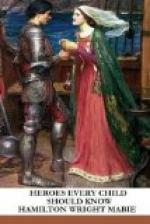Then he smote a second time with the sword, this time upon the marble steps. Loud rang the steel, but neither brake nor splintered. Then Roland began to bemoan himself, “O my good Durendal,” he said, “how bright and clear thou art, shining as shines the sun! Well I mind me of the day when a voice that seemed to come from heaven bade King Charles give thee to a valiant captain; and forthwith the good King girded it on my side. Many a land have I conquered with thee for him, and now how great is my grief! Can I die and leave thee to be handled by some heathen?” And the third time he smote a rock with it. Loud rang the steel, but it brake not, bounding back as though it would rise to the sky. And when Count Roland saw that he could not break the sword, he spake again but with more content in his heart. “O Durendal,” he said, “a fair sword art thou, and holy as fair. There are holy relics in thy hilt, relics of St. Peter and St. Denis and St. Basil. These heathen shall never possess thee; nor shalt thou be held but by a Christian hand.”
And now Roland knew that death was very near to him. He laid himself down with his head upon the grass putting under him his horn and his sword, with his face turned towards the heathen foe. Ask you why he did so? To shew, forsooth, to Charlemagne and the men of France that he died in the midst of victory. This done he made a loud confession of his sins, stretching his hand to heaven. “Forgive me, Lord,” he cried, “my sins, little and great, all that I have committed since the day of my birth to this hour in which I am stricken to death.” So he prayed; and, as he lay, he thought of many things, of the countries which he had conquered, and of his dear Fatherland France, and of his kinsfolk, and of the good King Charles. Nor, as he thought, could he keep himself from sighs and tears; yet one thing he remembered beyond all others—to pray for forgiveness of his sins. “O Lord,” he said, “Who art the God of truth, and didst save Daniel Thy prophet from the lions, do Thou save my soul and defend it against all perils!” So speaking he raised his right hand, with the gauntlet yet upon it, to the sky, and his head fell back upon his arm and the angels carried him to heaven. So died the great Count Roland.
CHAPTER X
KING ALFRED
We now come to the great King Alfred, the best and greatest of all English Kings. We know quite enough of his history to be able to say that he really deserves to be so called, though I must warn you that, just because he left so great a name behind him, people have been fond of attributing to him things which really belonged to others. Thus you may sometimes see nearly all English laws and customs attributed to Alfred, as if he had invented them all for himself. You will sometimes hear that Alfred founded Trial by Jury, divided England into Counties, and did all kinds of other things. Now the real truth is that the roots and beginnings of most of these things are very much older than the time of Alfred, while the particular forms in which we have them now are very much later. But people have a way of fancying that everything must have been invented by some particular man, and as Alfred was more famous than anybody else, they hit upon Alfred as the most likely person to have invented them.




